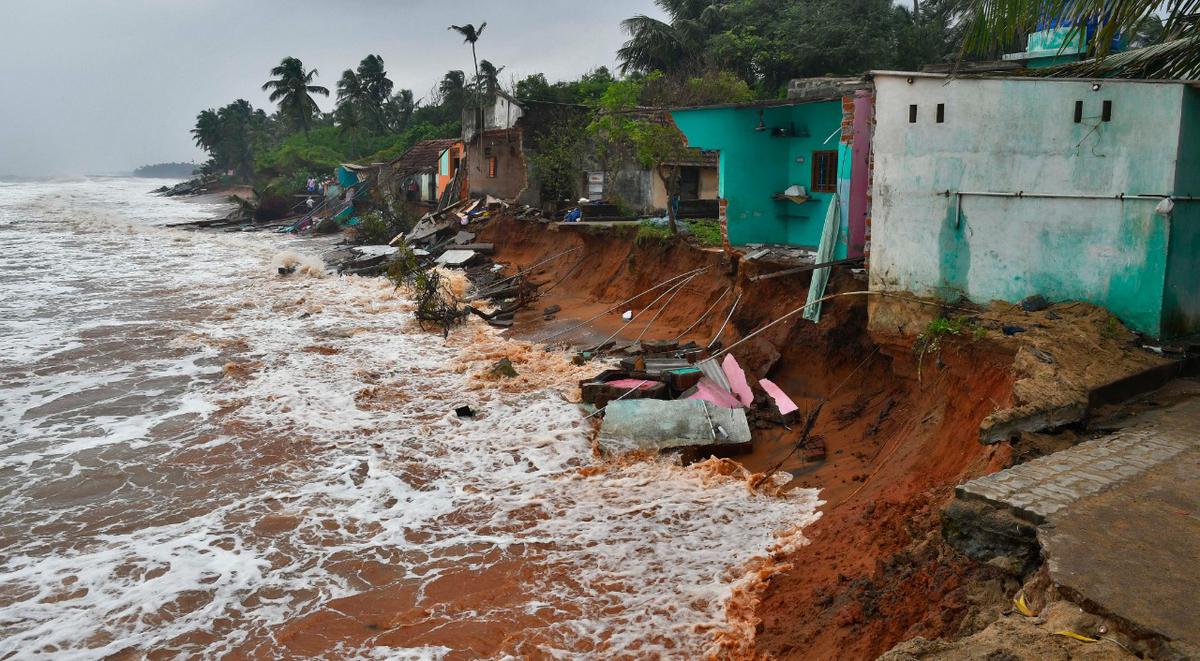


As Cyclone Fengal makes its way towards the coastal districts of Tamil Nadu, the India Meteorological Department has issued warnings for the region. Expected to hit the coast by Saturday evening, the cyclone has already caused changes in weather, with high tides and heavy rainfall. The IMD reports that it will cross the region between Karaikal and Mahabalipuram, bringing wind speeds of 70-80 km/h, posing a danger to the affected areas.
Cyclone Fengal: A Threat to Coastal Tamil Nadu
Cyclonic storm Fengal is an impending meteorological threat to the coastal districts of Tamil Nadu. The India Meteorological Department (IMD) has issued warnings for the region, forecasting the storm's arrival by Saturday evening.
Background
Cyclone Fengal is a tropical cyclone that developed in the Bay of Bengal. It is the first major cyclone of the 2022 season in the North Indian Ocean. The storm has already intensified into a deep depression and is expected to further strengthen into a cyclonic storm.
Expected Impact
As Cyclone Fengal approaches the coast, it is expected to bring strong winds, heavy rainfall, and high tides. The IMD predicts wind speeds of 70-80 km/h, posing a danger to coastal areas.
The storm is projected to cross the region between Karaikal and Mahabalipuram. The coastal districts of Chennai, Kancheepuram, Chengalpattu, Cuddalore, and Villupuram are likely to be heavily affected.
Current Situation
The IMD has issued yellow and orange alerts for the affected districts. Heavy rains have already begun lashing the coastal areas, causing flooding and waterlogging. Fishermen have been advised to stay away from the sea as strong currents and high waves are expected.
Top 5 FAQs
Q: When is Cyclone Fengal expected to hit Tamil Nadu?
Q: Which districts are likely to be affected?
Q: How strong will the winds be?
Q: What precautions should people take?
Q: Has Tamil Nadu experienced any major cyclones in the past?
Response and Mitigation
The Tamil Nadu government has activated its disaster response mechanism. Evacuations are underway in low-lying areas, and relief camps have been set up. The National Disaster Response Force (NDRF) has deployed teams to assist with rescue and relief operations.
Residents in the affected areas are urged to follow official guidelines, stay informed, and take all necessary precautions to stay safe during Cyclone Fengal.

A stampede at the Kasibugga Venkateswara Swamy Temple in Andhra Pradesh has left 10 dead and two injured. The temple had recently reopened and was experiencing high footfall due to a festival. Home Minister Vangalapudi Anitha has ordered a thorough investigation into the causes of the tragedy and has promised strict measures to prevent similar incidents in the future.

India and the United States have strengthened their already strong ties by signing a 10-year framework for their major defense partnership. The agreement, signed during a bilateral meeting between the two countries' defense ministers, emphasizes the importance of this partnership in maintaining a free and open Indo-Pacific region. This marks a significant step in solidifying the bond between India and the US in the defense sector.

In preparation for a major tri-service military drill, India has issued Notices to Airmen (NOTAM) for the entire northeastern region that borders China, Bhutan, Myanmar, and Bangladesh. The first set of exercises will commence in November and continue through January, signaling enhanced operational readiness for the Indian Air Force (IAF). This move is significant as the Northeast remains a sensitive theater, making up the boundary with four countries, including China. The upcoming IAF exercises aim to strengthen India's air dominance, effectively preparing for any potential challenges along the western frontier with Pakistan.

India will conduct a 10-day military exercise in Rajasthan and Gujarat involving the Army, Air Force, and Navy to showcase its operational readiness following Operation Sindoor earlier this year. The exercise, announced through a NOTAM, features advanced military technologies and emphasises the integration of speed, firepower, and precision in desert warfare conditions. It comes amidst heightened tensions with Pakistan and a renewed focus on maintaining military readiness along the border.

Jammu and Kashmir police have filed an FIR against a group of Christian missionaries in Kathua district for allegedly attempting religious conversions through financial incentives. This comes after a video surfaced online showing the missionaries being attacked and their vehicle vandalized by villagers. The incident has sparked outrage and protests from local Hindu groups, demanding action against the accused missionaries. One accused, Ravindra Singh Thela, has been arrested while the main accused, Vivek Soni, is still at large. The police have also suspended eight personnel for failing to stop the attack.

US Vice President JD Vance, who converted to Catholicism in 2019, has revealed that he hopes his Hindu-raised wife, Usha Vance, will eventually embrace Christianity. However, he clarifies that their interfaith marriage is built on mutual respect and understanding, and that Usha has complete freedom of choice in matters of faith. The couple has found a balanced way to manage their interfaith household, with their children attending a Christian school and given the choice to be baptized.

US President Donald Trump has expressed optimism about reaching a trade deal with China "pretty soon" after a meeting with Chinese President Xi Jinping in South Korea. In addition to announcing lower tariffs on Chinese imports, Trump also stated that the issue over US access to rare earths has been resolved. However, there has been no official response from Beijing and the final decision on the sale of Chinese-owned TikTok's US operations is still pending. Analysts see these developments as a breakthrough in the ongoing trade tensions between the two countries. Our correspondents provide insight on the discussions between the two leaders and speculate on why Xi may have felt confident walking into the meeting.

At the Asia-Pacific Economic Cooperation (APEC) Summit in South Korea, Chinese President Xi Jinping and US President Donald Trump met for their first in-person talks in several years. Despite past frictions, Xi called for closer cooperation between the two largest economies in the world, emphasizing the importance of being "partners and friends." Acknowledging Trump's peace efforts in the Middle East, Xi commended his contributions and praised him as a "tough negotiator." Trump also expressed optimism for a productive discussion on trade and global security.

In a historic event, Prime Minister Shri Narendra Modi addressed the Global Maritime Leaders Conclave and chaired the Global Maritime CEO Forum at India Maritime Week 2025 in Mumbai, welcoming participants from over 85 countries. With major shipping giants, startups, policymakers, and innovators in attendance, the summit showcased India's advancements in the maritime sector, such as the replacement of outdated colonial laws with modern ones and the recognition of large ships as infrastructure assets. Amidst global tensions, India stands as a symbol of strategic autonomy and inclusive growth, ready to take on a leading role in the world's rough seas.

Indian Prime Minister Narendra Modi has declared that the next generation of Goods and Services Tax (GST) reforms will begin on the first day of the Navratri festival. This major economic overhaul aims to streamline the current GST system and support businesses, especially small and medium enterprises. In other news, the National Human Rights Commission (NHRC) and Ministry of External Affairs (MEA) are collaborating to organize a six-day program in New Delhi to strengthen executive capacity for International Technical and Economic Cooperation (ITEC). Lastly, the upcoming BIRC 2025 conference will take place at the Bharat Mandapam in New Delhi.